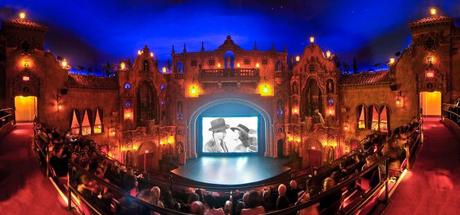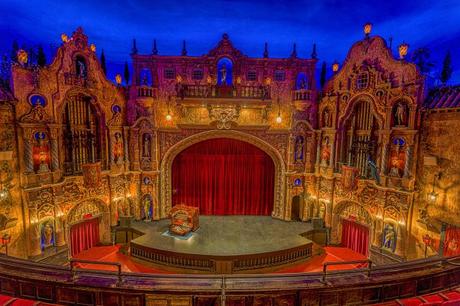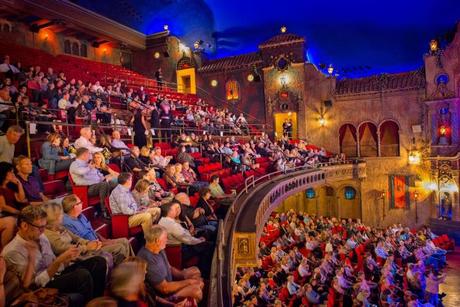Ornate sculptures, elaborate ceiling panels and magnificent portraits – while one would normally associate this decor with historical monuments and palaces, these are actually some of the first things that catch your attention as you enter the doors of the iconic Tampa Theatre. Standing tall in the city’s bustling downtown for over 90 years, Tampa Theatre allows film-lovers today to experience the magic and wonder of America’s golden age of cinema.
 Tampa theater exterior | Courtesy of Tampa Theatre
Tampa theater exterior | Courtesy of Tampa Theatre
Transporting audiences, then and now
Fuelled by the enormous amounts of money being made by the film industry at the time, cinemas were fast transforming from humble tents to monumental movie palaces. John Eberson was the pioneer of the atmospheric style of design, which was intended to transport the audience to a luxurious, European-inspired setting. Exotic courtyards, stately lighting and a ceiling that depicted a moonlit sky filled with twinkling stars were some of the key elements of his design. He designed close to 100 theatres across the United States and although few survive today, Tampa Theatre is a prime example of one of his most elaborate works.

Shortly after its opening, Tampa theater was buzzing with people and became one of the most popular places in town with shows being sold out 6 times a day for the first 3-4 years. But with the advent of the television and rapid development of the suburbs, theatres saw a drop-in footfalls and Tampa theater was on the verge of demolition by the early 1970s. Timely action by Tampa’s citizens and ample support from the City council resulted in the theater being saved and today the theater is managed by the Tampa Theatre foundation which is a not for profit organization. Since its reopening in January 1977 and listing on the National Register of Historic Places in 1978, the theater has been enthralling over 150,000 guests for about 600 events each year.
Architecture
The interiors of Tampa theater are a picture of grandeur, splendour and ceremoniousness. Visitors are instantly transported to a world of Mediterranean gardens and courtyards replete with gargoyles, stately lights and intricate work on the walls and ceilings. The highlight is the stage that stands amidst a palatial setting with decorated balconies, embellished domes and intricately designed pillars. The bright red chairs and elegantly carpeted floor only accentuate the setting. There is a distinct quality to all the grandiose that makes it imposing and enigmatic at the same time. As you make your way to the top, the impeccably recreated midnight blue sky adorned with sparkling stars just takes your breath away.

Most of the fixtures, furnishings and lamps are original and have been retained since the opening of the theater. The stately furniture of the men’s room and ladies parlour, the vintage telephone and bejewelled emblems are sure to transport you back in time.

Preserving the heritage
Restoration and maintenance is an on-going activity at Tampa theater. Aesthetic refurbishment projects are taken up periodically to retain the historic look and feel of the place. So, while shows and movies are screened a lot of work happens in the background in terms of planning and execution of these projects. Currently, there is a comprehensive restoration plan to address key infrastructure issues, revamp the seating as well making over the lobby and setting up of new concession counters and bars.
The Mighty Wurlitzer Theatre Organ
No piece on Tampa theater is complete without the mention of the Mighty Wurlitzer Theatre Organ. A mammoth 14-rank instrument has been in existence since 1926 in the theatre, this instrument was primarily used during the days of the silent movies.

Though temporarily lost, it was bought back by The Central Florida Theatre Organ Society (CFTOS) in 1980s and is played before every screening. It is indeed a mammoth task to maintain and operate the instrument and this is done voluntarily by the members of the CFTOS.
Visitors can learn more about this and the unique legacy of the theater by taking the “balcony to backstage” tour. This one takes visitors on an awe-inspiring tour of the theatre, unravelling the interesting stories behind this beautiful relic that is till today a thriving part of Tampa art and culture. To know more about Tampa theatre, do visit their website.
An edited version of this article was originally published on The Culture Trip. To read more articles of places in and around Tampa click here and here.
